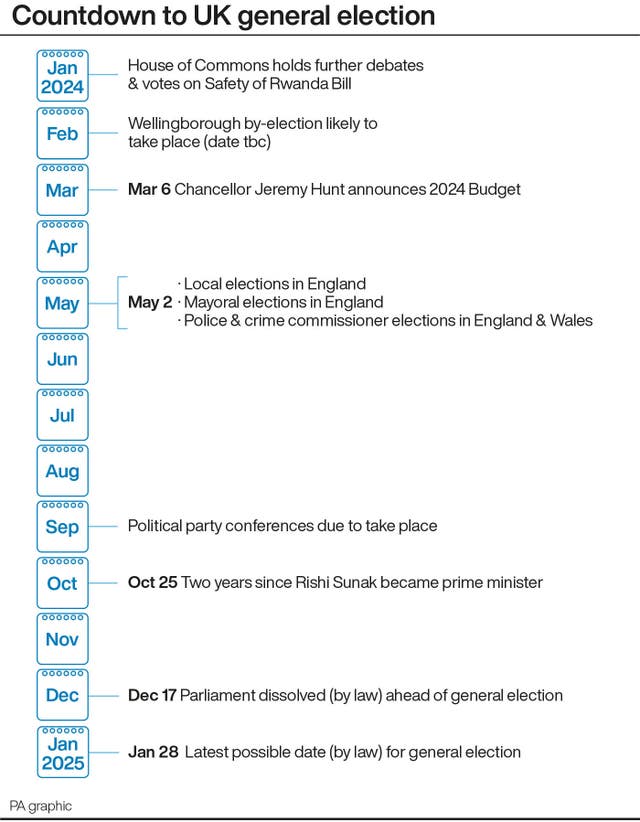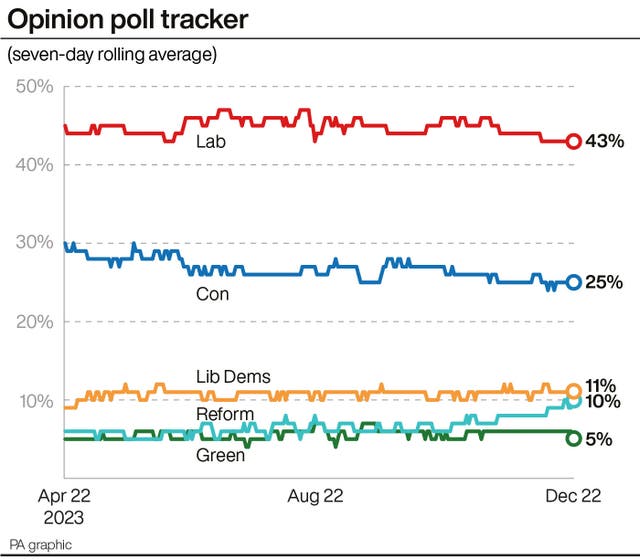Chancellor Jeremy Hunt has fuelled general election speculation and the prospects of tax cuts to woo voters by announcing a March 6 budget.
The Chancellor has commissioned the Office for Budget Responsibility (OBR) to prepare an economic and fiscal forecast to be presented to Parliament alongside the spring budget, described by the Liberal Democrats as a “last throw of the dice”.
The Conservatives have been dropping hints they could make attention-grabbing pledges on housing and taxes as Rishi Sunak tries to turn around his party’s major deficit in the polls and create policy dividing lines with Labour.
Mr Hunt’s confirmation of an early March budget leaves open the possibility of the general election taking place on the same day as local elections on May 2.
Polling day for a general election is 25 working days after Parliament has been dissolved.
A budget on March 6 gives time for Mr Hunt to outline his economic policy agenda and then for Mr Sunak to call an election in the week beginning March 25 to ensure it coincides with the local elections in England.
Shadow Treasury minister James Murray said: “The next Budget will come after 14 years of economic failure under the Conservatives that have left working people worse off.
“The tax burden is set to be the highest in 70 years, with 25 Tory tax rises since the last election alone, and economic growth is on the floor. Nothing Rishi Sunak and Jeremy Hunt do in March can repair the damage they have done to our economy.”

“It’s too late for Jeremy Hunt to turn the tide after his record of failure has left us with growth flat-lining and public services at breaking point. People will never forgive the Conservative Party for crashing the economy, wrecking the NHS and clobbering families with years of unfair tax hikes.
“The only way to repair the damage done by the Conservatives is to kick them out of office through a general election.”
Housing Secretary Michael Gove suggested to the Times that the Conservatives will promise to cut the up-front cost of a home for first-time buyers in a pre-election giveaway.
And Mr Sunak has ordered a “gear change” to reduce the historically high tax burden, possibly slashing death duties and reducing income tax, according to the Telegraph.
But Downing Street later sought to highlight the funding that inheritance tax is expected to raise for public services that “millions of us rely on”.
Asked on Wednesday whether the PM believes the tax is fair, a No 10 spokeswoman said she would not “enter into speculation” but added: “The tax is forecast to contribute £10 billion a year by 2028-29 to help fund public services that millions of us rely on.”
Both reports emerged as Mr Sunak struggles to turn the tide in favour of his party as Labour sits around 20 points clear in the polls.
The Times said ministers are considering Government support for longer fixed-term mortgages to reduce the size of deposits for first-time buyers.
A resurrected help-to-buy scheme was also said to be on the table for the spring budget or in the Conservative election manifesto.
The Chancellor @Jeremy_Hunt has commissioned the @OBR_UK to prepare an economic and fiscal forecast to be presented to @UKParliament alongside his Spring Budget on 6th March 2024. pic.twitter.com/ZoTSfsM4sQ
— HM Treasury (@hmtreasury) December 27, 2023
Asked by The Times whether the Conservatives would be able to go into next year’s expected election promising more help for first-time buyers, Mr Gove said: “Oh, yes, we must. Definitely.”
Meanwhile, The Telegraph said senior figures in No 10 were considering a handful of major tax cuts as Mr Sunak comes under continued pressure from Tory MPs.
Downing Street said on Wednesday said it “remain(s) committed” to creating more housing and getting more people on to the property ladder and cited previously announced mortgage-relief measures.
Cutting inheritance tax, in a move that would benefit the wealthy, would likely create a dividing line with Labour, which is unlikely to support such a cut.

Mr Hunt began to ease the historically high tax burden in his autumn statement, including by cutting national insurance.
But millions of workers will face a squeeze on their finances, with the tax burden still set to reach a record high while a freeze on thresholds remains in place.






